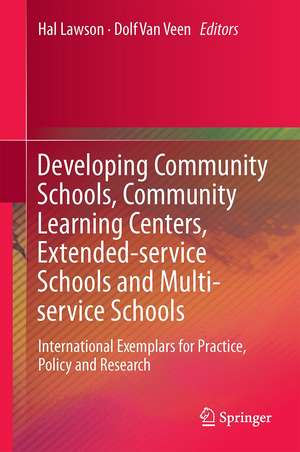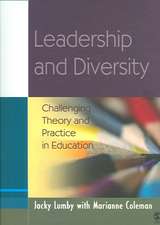Developing Community Schools, Community Learning Centers, Extended-service Schools and Multi-service Schools: International Exemplars for Practice, Policy and Research
Editat de Hal A. Lawson, Dolf van Veenen Limba Engleză Hardback – 18 dec 2015
| Toate formatele și edițiile | Preț | Express |
|---|---|---|
| Paperback (1) | 648.24 lei 6-8 săpt. | |
| Springer International Publishing – 30 mar 2019 | 648.24 lei 6-8 săpt. | |
| Hardback (1) | 654.62 lei 6-8 săpt. | |
| Springer International Publishing – 18 dec 2015 | 654.62 lei 6-8 săpt. |
Preț: 654.62 lei
Preț vechi: 770.14 lei
-15% Nou
Puncte Express: 982
Preț estimativ în valută:
125.27€ • 129.43$ • 104.20£
125.27€ • 129.43$ • 104.20£
Carte tipărită la comandă
Livrare economică 20 martie-03 aprilie
Preluare comenzi: 021 569.72.76
Specificații
ISBN-13: 9783319256627
ISBN-10: 3319256629
Pagini: 437
Ilustrații: XVIII, 437 p. 57 illus., 38 illus. in color.
Dimensiuni: 155 x 235 x 25 mm
Greutate: 0.81 kg
Ediția:1st ed. 2016
Editura: Springer International Publishing
Colecția Springer
Locul publicării:Cham, Switzerland
ISBN-10: 3319256629
Pagini: 437
Ilustrații: XVIII, 437 p. 57 illus., 38 illus. in color.
Dimensiuni: 155 x 235 x 25 mm
Greutate: 0.81 kg
Ediția:1st ed. 2016
Editura: Springer International Publishing
Colecția Springer
Locul publicării:Cham, Switzerland
Public țintă
ResearchCuprins
Preface.- 1: Introducing New Models for Schools and Services; Hal A. Lawson & Dolf van Veen.- 2: An International Perspective with Comparative, Action-oriented Analysis; Hal A. Lawson & Dolf van Veen.- 3. The Children’s Aid Society’s Community Schools; Jane Quinn (committed).- 4. Cincinnati Ohio’s Community Learning Centers; Darlene Kamine (committed).- 5. University-assisted Community Schools; Ira Harkavy (considering).- 6. Schoolplus in Saskatchewan, Canada; Twyla Salm (committed).- 7. Multi-Service Schools in the Netherlands; Jeanette Doornebal and Dolf van Veen (considering).- 8. Extended Schools in England; Alan Dyson (committed).- 9. Broad Schools in Belgium; Lia Blaton (committed).- 10. Ganztagschule/All-Day School in Germany; Sandra Augustin-Dittmann (considering).- 11. Cross-case analysis and comparisons: The import of an international and comparative approach; Hal A. Lawson & Dolf van Veen.- 12. Looking Ahead to Create More Desirable Futures; Hal A. Lawson & Dolf van Veen.
Notă biografică
Hal A. Lawson is Professor of Educational Administration and Policy Studies and Professor of Social Welfare, University at Albany, State University of New York. Hlawson@albany.edu
Dolf van Veen is Head of the Netherlands Centre on Education and Youth Care, Honorary Professor at the University of Nottingham, England, and affiliated with Windesheim University of Applied Sciences, The Netherlands. D.van.veen@windesheim.nl
Dolf van Veen is Head of the Netherlands Centre on Education and Youth Care, Honorary Professor at the University of Nottingham, England, and affiliated with Windesheim University of Applied Sciences, The Netherlands. D.van.veen@windesheim.nl
Textul de pe ultima copertă
This book focuses on special organizational configurations for schools in diverse parts of the world. Some of these new organizational and institutional designs are called multi-service schools, others are called extended service schools and still others are called community learning centers. While these schools have different names and notable different characteristics, they belong in the same category because of a common feature in their design: they connect schools with once-separate community programs and services.Chief among the prototypes for these new organizational and institutional designs are the ones featured in the book’s title. Some are called multi-service schools to indicate that they selectively provide some new programs and services. Others are called extended service schools to indicate that they serve young people beyond the regular school day, seeking influence and control over out-of-school time while enabling alternative teaching-learning strategies, and providing services other than typical “pupil support services.” Still others are called community learning centers, a name that showcases the educational functions and priorities of schools and announcing priorities for adult learning and development. Community schools, still called in some places full-service community schools, serves as a prototype that increasingly positions schools as multi-purpose, multi-component, anchor institutions serving identifiable neighborhoods and entire rural communities. The book is structured to enhance understanding of these organizational prototypes and provides comparative social analysis. It also identifies knowledge needs and gaps as well as developmental territory for the future.
Caracteristici
Enables readers to develop analytical understanding and practical competence of the defining and core features of new kinds of schools Presents key-findings, conclusions, lessons learned, policy implications and leadership priorities in an international-comparative context Addresses next phases, future priorities and the challenges of institution-building in the 21st century ? Includes supplementary material: sn.pub/extras














